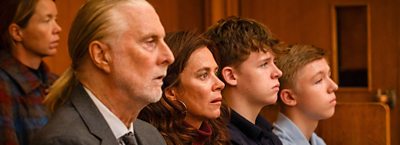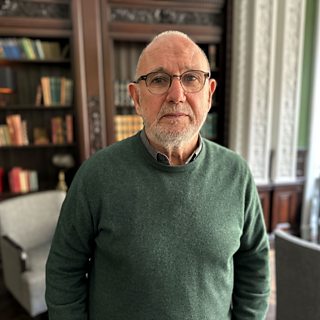Unforgivable, an original drama from multi-award-winning screenwriter Jimmy McGovern (Time, , The Street) centres around the Mitchell family who are dealing with the devastating aftermath of an act of abuse perpetrated by a member of their own family. The drama examines the extensive ripple effect of abuse from multiple perspectives and how those involved can try to move forwards in the midst of the devastation.
Directed by Julia Ford (Showtrial, , ), the drama is made by LA Productions (Broken, Anthony, Care) for ÃÛÑ¿´«Ã½ iPlayer and ÃÛÑ¿´«Ã½ Two.
Why is Unforgivable a story you wanted to tell?
I received a letter from a woman who works with sex offenders and wanted to speak to me. She spoke no holds barred about her job and working with sex abusers. She told me certain facts and figures that are quite unbelievable, so I want people to watch the film and learn things about child abuse. I felt compelled to write about it.
Is it common for people to approach you with ideas in that way?
Yes, I do hear from lots of people, and they've all got burning issues, you know but you can't go to all of them. Another that sticks out for me was which is about joint enterprise. The person had sent me a letter which had taken a month to reach me and I was going to write back and say no for all kinds of reasons, but I decided to phone and say no. As soon as I heard the human voice I was sucked in.
So you've got to be careful of that. You've got to be careful of saying yes to everybody, otherwise you'd be at everybody's beck and call. But there are some stories that are so good, so interesting, that you can't say no, and on this one (Unforgivable) there was that type of story.
You've written about this topic before in different ways with shows including Priest and Broken. Can you share why you wanted to explore this from a new perspective?
I’ve always been quick to condemn child abusers, as we all are and as we all should be. This is not a film that goes easy on child abusers at all. I wanted the audience to hear a few of the things I'd learned. I think we should be ultra cautious whenever we're dealing with abusers. I’m a father and a grandfather, I would find it very hard to forgive somebody who had done that to me or my family.
What drives you to write these stories?
I think it's got to interest me. It's got to seize my soul and if it doesn't do that then I won't be able to sit at the computer to write.
The more challenging the story the easier it gets for me. It keeps me interested. It keeps me writing. I find writing so hard. I warn everybody. The older you get, the harder it becomes, you know. But I say to myself, why write something that doesn't matter? You may as well write about things that matter, and I try to do that all the time.
You often grapple with challenging subjects and, as you say, that drives you to write but are there any coping mechanisms you have as a writer when facing those issues?
I've got a big family. I've got kids and grandkids, and they just keep your feet on the ground. Keep you anchored. You know I’ve got great friends who would support me. I met them because I was writing about the Hillsborough football disaster. I've got other people I know would support me because I met them writing about joint enterprise, so I've made friends through my writing. In the case of the subject matter was horrendous, but the writing of it was never a negative thing, you know.
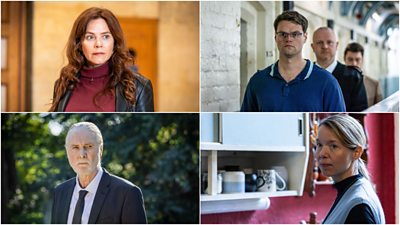
Can you tell us about the individual storylines and who we focus on in the drama?
We zone in on Joe, the perpetrator of the abuse, but we also zoom in a lot on his sister, who's the mother of the child he abused. He abuses his own nephew - I think you've got to show the enormity of that crime. It really is an atrocious crime. If you do it, you deserve to go to prison and suffer the consequences within the prison. We also show the boy affected by it, Tom, and his refusal to speak. He can't communicate because he knows if he had been able to communicate at the time it was about to happen, it would not have happened. That's a huge thing for a child to feel and the consequences of that have been enormous.
Tell us about Joe, where is he at the start of the drama and how does he change throughout the drama?
He hates himself and blames himself. He thinks that it's not worth opening up to anybody because people are just going to hate him for what he's done. He then learns at a crucial point in the drama that there could be a reason why he did what he did - because he too was sexually abused. This makes him want to go after the man who abused him, which he's never thought of doing. The family's been torn apart and his poor mother has died after an illness - he's convinced his mother died because of what he did. We see all of the ramifications.
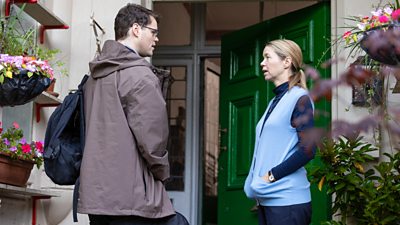
How do you approach writing and fleshing out a character like Joe considering what he's done?
Apart from the actual offence, I think every part of Joe's character is part of my character. I think it's the only way I can write. I have to invest myself in every character I write, so they are all aspects of me, sometimes me at my worst, and sometimes me at my very best. I think that that's the only way I can do it and I've done that with Joe, despite what he's done. I can't say he's a good man, because he's committed this enormous crime, but despite what he's done, he's a human being.
So the drama is told from not just Joe's perspectives but multiple points of view. What are the challenges or benefits of writing in this way as opposed to a single protagonist perspective? Do you have a preference?
I think that's decided by the story, you know, and you couldn't do from any other perspective than 's, could you?
I do prefer other perspectives to be included as well, because it just allows you to take the high points of each story within this big main story that you're telling and leave out the boring bits in the middle. That's the main advantage of a multi perspective.
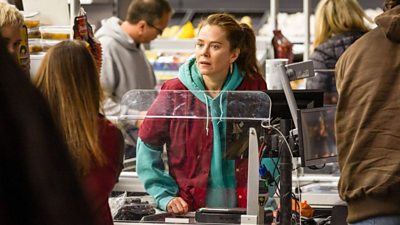
Unforgivable is a film, was this always the proposed format?
We started off with the idea of doing a 6-part drama series set in St. Helen's because the guy I was going to write with was born and brought up there. his name is. He's a cracking old time, stalwart of a writer and we worked together on . But Andy wasn’t able to do it unfortunately. In the meantime, I had met the psychologist who had contacted me and that then became a single story. I didn't want to throw that one away, you know.
Interestingly enough, because quite a few of the scenes are counselling scenes, the drama was very much longer than we thought it would be. It’s difficult to get anything longer than an hour and a half screen time but this is an hour and 3 quarters. The ÃÛÑ¿´«Ã½ decided to keep it at that length because I think it deserves to be at that length. It needs time.
Some great dramas have come out of Liverpool in recent years (The Responder, This City is Ours) - are there common ingredients you think these share other than location?
I've never really thought about that. The content. I've always thought of it from the other end, who the writers are you know. Why are so many writers scousers?
The crucial thing for me is that Liverpool’s a port city, and that's the ingredient of scouserism in a way, the curiosity about the traveller that comes from being born and brought up in a big international port. Where are you coming from? Where are you going to? There are writers from all over the world, I know, but there are many from Liverpool, and I think that curiosity about people lends itself to becoming a dramatist.
Related Links
-
Watch Unforgivable on ÃÛÑ¿´«Ã½ iPlayer
-
From our Be Inspired series
Latest blog posts
More blog postsSearch by Tag:
- Tagged with ÃÛÑ¿´«Ã½ Two ÃÛÑ¿´«Ã½ Two
- Tagged with Drama Drama
- Tagged with Blog Blog
- Tagged with 2025 2025
